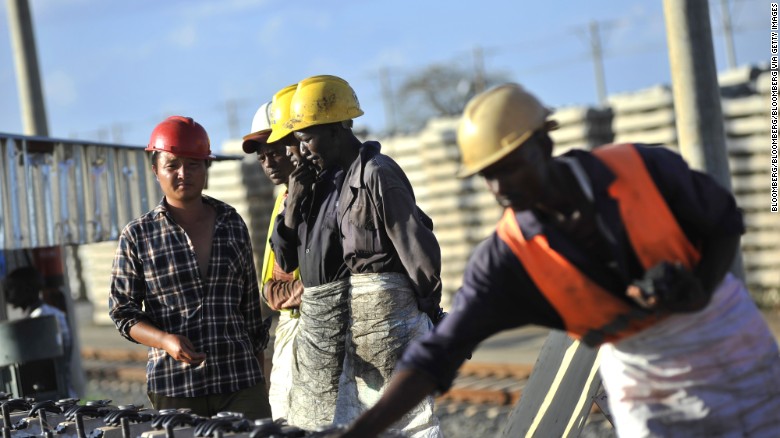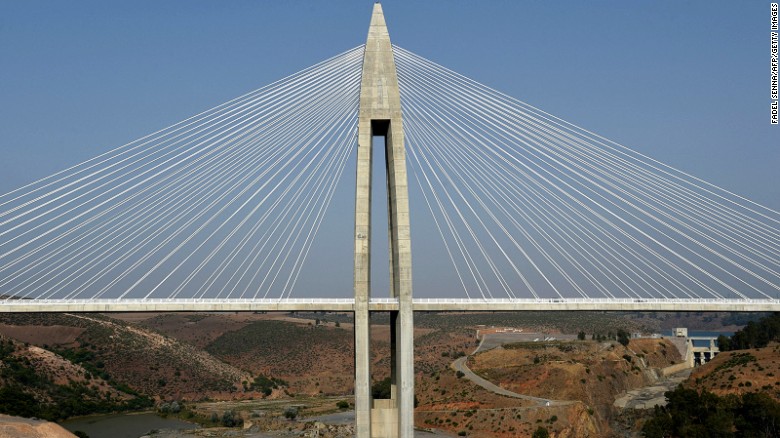Free gift? China extends influence in Africa with $32M grant for regional HQ
(CNN)China raised eyebrows this month by announcing it will give the Economic Community of West African States (ECOWAS) a $31.6 million grant to build a new headquarters in Abuja, Nigeria.
Accepting the grant, the president of ECOWAS, Jean-Claude Brou, thanked China and confirmed the organization's commitment to promoting future ECOWAS-China cooperation. A press release said that Brou called this a mark of goodwill from China.
But critics questioned the Asian economic powerhouse's motives for the donation, which positions it at the center of West African politics.
Sponsor Content
From Catalunya to California: Hong Kong's hottest new eats
One of Hong Kong's biggest draws is its vast array of places to eat. Here are 10 of the mostexciting new restaurants to try in 2018.
Promoted By Hong Kong Tourism Board

African, right, and Chinese workers, left, build railway track sections for the Mombasa-Nairobi Standard Gauge Railway (SGR) line in Tsavo, Kenya.
Earlier this year, a published report in the French daily, Le Monde, alleged that Beijing spied on the African Union through the computer systems it helped install. Citing anonymous sources, Le Monde reported that data was transferred from the AU systems in Ethiopia to its servers in Shanghai. China's foreign ministry called the Le Monde report "groundless accusations." The AU called the report "baseless."
"People will interpret this as a symbolic expression of China's growing presence in Africa," says Ian Taylor, a professor in international relations and African political economics at the University of St. Andrews, in Scotland.
"But the real question is 60 years after independence (for most member states), why does ECOWAS think it's acceptable for a foreign power to build its headquarters?"
ECOWAS and the Chinese Ministry for Foreign Affairs did not respond to CNN's requests for comment.
Why did ECOWAS accept?
ECOWAS was established in 1975 to foster economic integration and collective self-sufficiency in West Africa.
Its 15 member states include one of Africa's biggest economies by GDP, Nigeria, causing Taylor and others to ask why ECOWAS isn't self-funding the facility. Had the members split the bill, it would have cost just over $2 million each.
Philip Olayoku, project manager at the Abuja-based Information Aid Network, says the official numbers are misleading and many countries in the grouping don't have cash to spare for such projects.
"For me, reliance on GDP is the wrong way to determine how well a country's economy is doing," he says. Corruption in many West African governments, he explains, means "funds that are accrued for national growth are often not where they need to be," impairing a country's ability to contribute effectively to bodies such as ECOWAS.
Photos: Trillion dollar deals: The China-Africa partnership in pictures
Total coverage – China's scarves have found their largest African market in Egypt, which imported supplies worth $45 million in 2014. The nations also have a healthy exchange of carpets, with multi-million dollar supplies traveling in both directions.
Hide Caption
10 of 19
Photos: Trillion dollar deals: The China-Africa partnership in pictures
Holiday homes – A recent report from the Centre for Chinese Studies at Stellenbosch University in Cape Town documented increased Chinese investment in real estate in South Africa and Mauritius, worth around $740 million in the island state since 2005.
Hide Caption
11 of 19
Photos: Trillion dollar deals: The China-Africa partnership in pictures
Curtain call – China has also invested heavily in cultural projects across Africa. Theaters have been a priority area, including Senegal's new 1800-seat Grand National in Dakar (pictured), largely funded through Chinese aid.
Hide Caption
12 of 19
Photos: Trillion dollar deals: The China-Africa partnership in pictures
Stadium diplomacy – 'Stadium diplomacy' has been another feature of Chinese investment, with new arenas in Cameroon, Ghana, and Angola's November 11 stadium in Luanda (pictured).
Hide Caption
13 of 19
Photos: Trillion dollar deals: The China-Africa partnership in pictures
Medical aid – Dozens of African hospitals have been built with Chinese funds in recent years. President Xi Jinping inaugurated this hospital and a new university library in Brazzaville, Republic of Congo, in 2013.
Hide Caption
14 of 19
Photos: Trillion dollar deals: The China-Africa partnership in pictures
Strength in unity – The headquarters of the African Union in Addis Ababa, Ethiopia, was built with $200 million of Chinese state funds.
Hide Caption
15 of 19
Photos: Trillion dollar deals: The China-Africa partnership in pictures
Transport upgrades – China's largest commitments in Africa are to infrastructure projects, such as Nigeria's $8.3 billion Lagos-Kano rail line, largely funded through Chinese loans.
Hide Caption
16 of 19
Photos: Trillion dollar deals: The China-Africa partnership in pictures
Turning the tide – Ghana has been able to mitigate electricity shortages through the Bui Dam on its Western border, which incorporates a 400-megawatt hydropower plant. The $600 million project was constructed by the Sino Hydro company, supported by Chinese state loans.
Hide Caption
17 of 19
Photos: Trillion dollar deals: The China-Africa partnership in pictures
Fueling development – China has supplied credit worth over $2 billion to an oil refinery project in Angola, although this has been hit with delays.
Hide Caption
18 of 19
Photos: Trillion dollar deals: The China-Africa partnership in pictures
Road less traveled – The 50-kilometer, eight-lane Thika superhighway was built by Chinese state-owned construction firm Wu Yi in 2012, and supported with Chinese funding.
Hide Caption
19 of 19

Photos: Trillion dollar deals: The China-Africa partnership in pictures
Bridging cultures – Trade and partnership deals between African countries and China have been steadily increasing in recent years. This summer saw the completion of Morocco's Mohammed VI Bridge, a $72m project built by Chinese development group Cover-Mbec.











